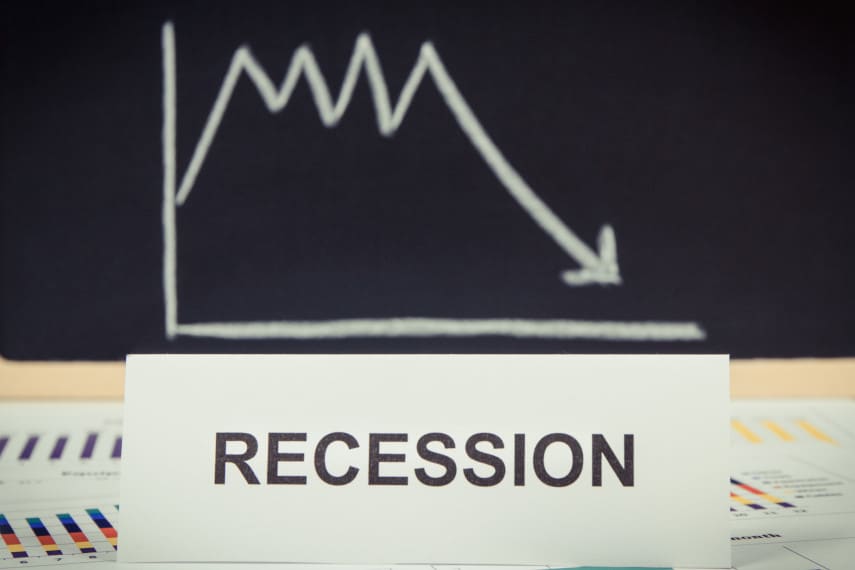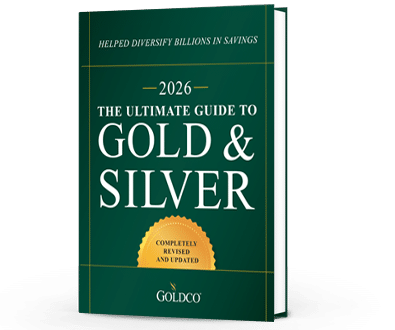3 Things That You Should Know About Inflation
Only a few short years ago, the United States experienced the highest inflation rates in over 40 years as inflation rates peaked at over 9% That was a wake up call for many Americans who had been...
Economy

Did you hear the latest news from the mainstream media? The US economy is no longer going to be in recession! Isn’t that wonderful! So forget about how badly inflation has taken a bite out of your pocketbook and keep on spending, because everything is going to be just fine!
Well, actually things might not be that rosy after all. And in fact, the more you look under the hood of the economy, the worse things seem to appear. If you have a sense of fear and foreboding about what the future holds, you’re not alone.
Many Americans are worried about the future, and they’re trying to protect themselves against what’s coming. Whether that’s moving money from bank accounts to money market funds, protecting their retirement savings with a gold IRA, or even just stuffing money under a mattress, financial survival is becoming increasingly important.
But if you weren’t already aware that the US economy could be facing a crisis, here are 9 signs that are pointing to a potential recession.
One of the characteristics of recession is that consumers cut back on spending. It can be easy to cut back on superfluous spending on luxury items and discretionary spending. But when consumer staples start to see cutbacks, you know things are getting real.
One of the last things most people are going to cut back on is food. Everyone needs to eat. Most people, when faced with the choice between buying a new article of clothing or having a filling dinner, are going to pick the food. So when households start cutting back on food spending, you know they’ve likely cut back elsewhere as far as they can and are really in bad shape.
Tyson Foods, for example, is seeing reduced revenue as consumers are shifting from beef to chicken and pulling back on overall meat consumption. And this doesn’t appear to be a temporary blip either, but rather a growing trend that will cause difficulty for food producers.
If Americans are cutting back on buying food, you would expect them to be cutting back on other spending too. And sure enough, looking at retailers like Home Depot we see that Americans are cutting back on discretionary spending that helps with home upkeep.
In the case of Home Depot, sales are expected to drop by up to 5%, earning are expected to drop up to 13%, and purchases of big ticket items over $1,000 are already down 5.5%. That shows that consumer discretionary spending is really starting to slow down.
If consumer spending is really slowing, you would expect that to be reflected elsewhere in the economy too. And that’s where trucking and shipping come in.
Trucking volumes are down the most they’ve been since the beginning of the pandemic, with shipment volumes down 9% after five consecutive quarters of decline. If trucks aren’t moving products, it’s because consumers aren’t buying, and that indicates that recession is on the way.
The Conference Board’s Leading Indicator Index recently fell for the 16th consecutive month. The index is showing some of its worst performance since Lehman Brothers failed in 2008. Looking at the chart and comparing its performance today to previous recessions, it seems as though the US economy may even already be in recession.
One of the most concerning indicators about the financial health of American households is the fact that 61% of them are living paycheck to paycheck. For many of them, they’re one pink slip away from being financially destitute.
That’s not a promising sign for a country that is trying to keep itself out of recession. Nor is it a promising sign for when the country eventually tries to recover from recession. With so many households in such financial straits, how can anyone claim that the US economy is strong and poised for growth?
One of the reasons so many households are in such dire shape is the fact that the COVID-era stimulus payments have just about run their course. Any excess savings households may have set aside from those payments are just about done.
While you may hear the mainstream media touting strong consumer spending as one reason the economy is still going strong, that spending was driven largely by stimulus payments and, more recently, credit card debt. With savings depleted and credit card debt at record highs, expect consumer spending to start petering out.
An underappreciated aspect of recessions is the fact that tax revenue for governments ends up decreasing, sometimes in unpredictable fashion. We saw this during the 2008 financial crisis, when government tax receipts plummeted.
Between businesses that see increased losses and households that are put out of work, it’s understandable that recessions would result in less tax revenue. And today we’re starting to see tax revenues falling yet again, another sign that the economy could be entering into a recession.
Whereas the 2008 crisis was fueled by the collapse of the housing market, the next crisis could end up being fueled by a collapse in the commercial real estate market. Rates on commercial real estate loans generally reset after five years. Now that we’re entering an era in which interest rates are significantly higher than they were five years ago, a lot of commercial tenants could end up facing financial difficulties paying their loans.
Delinquency rates on commercial real estate loans are already rising at the fastest rates ever. And while overall delinquencies are still lower than they were post-2008, with the recent upward trend there’s no telling how bad the commercial real estate market could get.
We’re all familiar with the job cuts that have pervaded the tech sector. But those companies aren’t the only ones cutting. It seems like every week brings news of more companies tightening their belts and letting workers go.
Doesn’t it seem strange that an economy that is supposed to be as “strong” as the mainstream media say it is keeps hemorrhaging jobs at major companies? And particularly during a period in which the unemployment rate is so low? Companies aren’t cutting costs because they’re flush with cash and anticipating a strong economy, they’re doing it because they’re preparing for recession and trying to position themselves to ride things out.
Recessions aren’t anything new. We’ve all experienced them and we’ll all experience more of them before we die. But the one strange thing about this coming recession is how long it has taken to develop.
The 2008 crisis itself wasn’t an overnight crisis either. The recession officially started in December 2007, but it wasn’t until September 2008 after Lehman Brothers failed that most people really began to panic, and it wasn’t until December 2008 that NBER officially declared the economy to be in recession.
If the economy is already in recession today, it’s certainly an interesting and long developing one. But perhaps most importantly, it’s one that is giving investors plenty of time to make plans to protect their assets.
One way many people are doing that today is through a gold IRA. A gold IRA is a tax-advantaged retirement account that allows you to own physical gold coins or gold bars while still enjoying all the same tax benefits of an IRA account. You can even fund a gold IRA with a tax-free rollover or transfer from an existing 401(k), 403(b), TSP, IRA, or similar retirement account.
With a gold IRA you have all the benefits of owning gold while also enjoying the tax advantages of an IRA. It’s no wonder so many Americans today are turning to gold IRAs to help protect their hard-earned retirement savings.
Goldco has helped thousands of Americans benefit from owning gold, with over $2 billion in precious metals placements and over 5,000 5-star reviews. If you’re worried about recession and want to protect your hard-earned retirement savings, call Goldco today to find out why so many people have trusted Goldco to help them benefit from owning gold.

